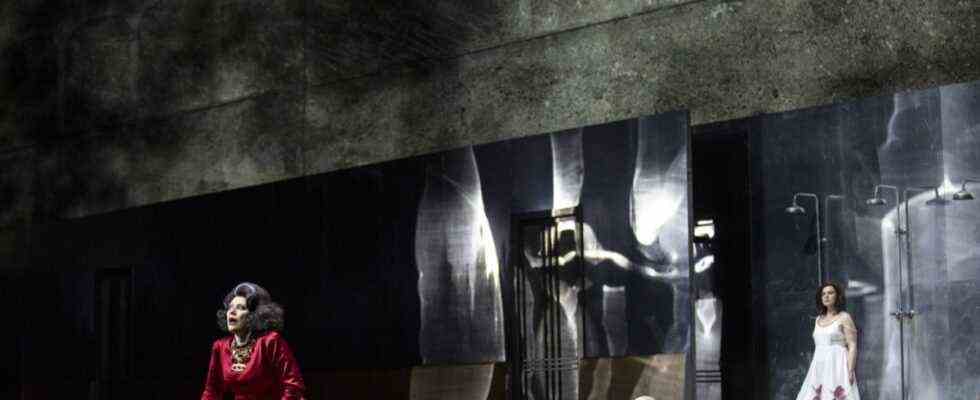Caught in hatred and malice: Ausrine Stundyte as Elektra in a production by Krzysztof Warlikowski.
(Photo: Bernd Uhlig / SF)
Director Krzysztof Warlikowski lets Richard Strauss’s opera “Elektra” begin with a huge speech monologue by the murderess of her husband, Klytämnestra (Tanja Ariane Baumgartner), and only then, after the first dramatic excesses, does the music begin at the Salzburg Felsenreitschule. Tied even more closely to the spoken word, that applies in this opera not only to the Agamemnon motif that appears again and again, but generally to the creation of a new theatrical sound language. It is even more unsettling in its tightrope walk between concrete intuition, meaning and lack of concept. The music grows out of the spoken drama, as it were, but not in the clichéd sense that it starts where the word fails. On the contrary, it first takes back what is happening in order to rearrange it, to assign it to another sphere of experience. The monologue of Elektra (Ausrine Stundyte), the vindictive daughter of Clytemnestra and Agamemnon, now becomes equally appellative and inner speech.
It is still unclear what will happen. The images overlap, on the right, Elektra and Orestes step into the pool as innocent children, which can also be a large baptismal font. The broad left side of the stage is dominated by a black block, reminiscent of the Kaaba of Mecca, later it appears illuminated from the inside and accessible, at the end it will slowly and threateningly slide over the pool like a coffin. Much is buried in it, the murdered mother and her companion and also the whole longing for life, the whole life of Electra. Nothing remains of her either.
Revenge for the king is really revenge for the loss of one’s status
And as much as Strauss’s quick-tempered and soothing music determines the event, it also draws the characters down to the smallest detail – the morally ailing Klytämnestra, the no less violent Elektra, the gentle Chrysothemis. It’s a purely women’s opera, Orestes and his companion are very small roles. Director Warlikowski empathizes with the music and provides an optimal framework for the sparse external and all the more drastic internal actions. Large-scale video projections of disturbed people and frantically crawling insects complement the impressive look, abrupt changes of light dramatize them, but never steer away from the action, the psychological battles that have to be fought to the bitter end.
At first the situation seems hopeless, the humiliation that Elektra has to endure after the murder of her father Agamemnon, the hero-king, by her mother and her new companion Aegisth, she does not want to accept. Her thirst for vengeance grows immeasurably, and it is clear that vengeance for the father is actually vengeance for the loss of the status of a king’s daughter. Just as the mother murdered because Agamemnon, she says, disregarded her rights, so the daughter also wants to murder for the sake of justice. The brother Orest (Christopher Maltman) has to fix it, but he is far from home, soon the news comes that he has been killed by his own horse. Here conductor Franz Welser-Möst could perhaps have let the orchestra of the Vienna Philharmonic howl a little louder, one would have wished it, because Elektra does not know that the death report is false. The knowing orchestra, however, acts as it were with the handbrake on and saves the tonal impact hits for the end, which Strauss himself said was “juicy”.
The germ of the next murders is laid in murder
But there is still a long way to go, a hysterical battle of gigantic proportions. Elektra is furious, her sister Chrysothemis wishes her marital happiness: “I am a woman and want a woman’s fate”, librettist Hugo von Hofmannsthal lets her exclaim. Even if you gave it to a farmer, she says, she would like to bear children for him and keep them warm on her chest on cold nights. That really upsets Elektra. So little solidarity among women? She was just about to persuade the sister to commit matricide with her: “Do it, then you will be strong.” Orestes now seems to have failed, and now Chrysothemis is betraying holy vengeance on a pitifully petty life plan. This woman is not to be expected, and so the unexpected reunion with Orestes, whom Elektra does not recognize at first because she no longer believes in her luck of revenge, turns into a sheer dance of joy, a love duet.
Strauss really wrote sweet love music for it, which only makes everything even more gruesome. Because love is not for the rediscovered brother, but for the renewed hope of blood revenge. Hatred and malice, they triumph and rule Elektra, and she is trapped in it like in a gloomy room that is getting narrower and narrower. In contrast to the previous opera “Salome”, Strauss made the role of Elektra extremely complex, always illuminating the character and their actions and feelings anew, even if the end result was always the same: as understandable the thirst for revenge is, the murder is inevitable offers as a solution, so little has been gained, so much has the germ of the next murders been laid.
If you want to understand how the music grows beyond the terminological language, how it usurps the discourse, you are at the right place with this opera. And especially in Warlikowski’s fantastic staging as a hysterical, subtle psychodrama. It is also great that you can experience the premiere cast of 2020 once again: Tanja Ariane Baumgartner as the powerful-voiced Klytämnestra, shimmering in all shades of anger, despair and malevolence. The Ausrine Stundyte, which is not listed below, as Elektra, and optionally Asmik Grigorian or, as in the first revival performance, Vida Mikneviciute with a wonderfully flowing, tart soprano as Chrysothemis – the impressive new voice of this evening.

